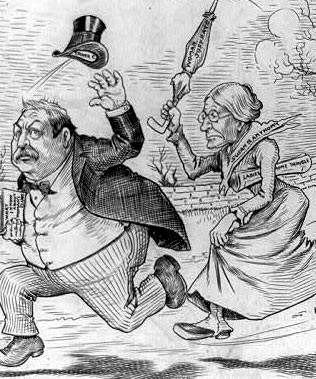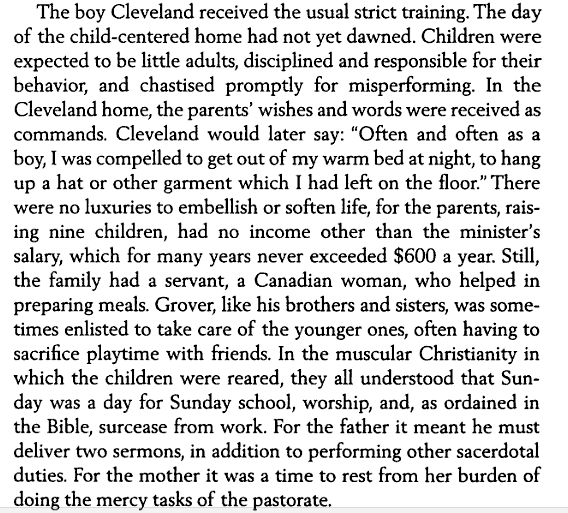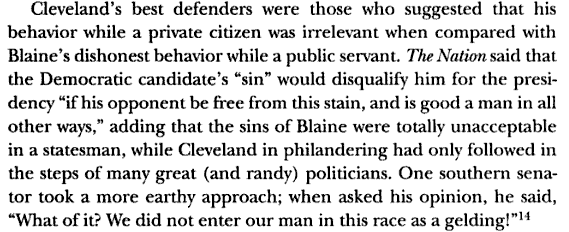Ye Olde Sex Scandals: Grover Cleveland's Love Child
by Elisabeth Donnelly

Oh, to be a governor of New York — if you’re not dealing with a sex scandal, you’re not doing it right. Take the case of our 22nd and 24th President, Grover Cleveland. (The only guy to serve two nonconsecutive terms, and the second bachelor — but not for long — to take office.) If there’s one thing that’s true, it’s this: a bachelor politician equals girl trouble for sure.
Freed from the freezing shackles of Buffalo, where he was mayor, the New York governor was kicking it in Albany with his political shtick of “honesty” — which gave him the nickname “Grover the Good” — when the Democrats decided that he was the best candidate for President in June of 1884. He appealed to both Democrats and reform-minded Republicans (who were referred to disparagingly by The New York Sun as “Mugwumps”; they later reclaimed this term as a point of pride), and who hated candidate James G. Blaine for his ties to the railroads and stocks. Cleveland’s campaign had the slogan “Public Office is a Public Trust,” coined by reporter William H. Hudson.

Yes, from the beginning, Cleveland was a nice boy!
On July 21, 1884, though, the Buffalo Evening Telegraph tried to change the game on Cleveland, with an article: “A Terrible Tale: A Dark Chapter in a Public Man’s History.” This bombshell, subtitled ‘The Pitiful Story of Maria Halpin and Governor Cleveland’s Son,’ detailed, according to Republican loyalist and pastor Reverend George H. Ball, how the rotund bachelor Cleveland “seduced” a Buffalo resident — and likely wanton woman — named Maria Halpin, who had his now ten-year-old son out of wedlock. It was, “an epic of moral depravity…between brothel and the family, indecency and decency, between lust and law.”
This was a salacious piece, and was doomed to irrelevancy-until the Blaine-supporting Boston Review took it up. Scandal ensued, and the story broke nationally. (The Nation, it should be noted, said that Cleveland’s sin should be a disqualifier if the opponent was good “in all other ways”-but Blaine was a dick, essentially, and Cleveland’s indiscretion was just in the tradition of randy politicians.) The Republicans started bringing children to Cleveland rallies to chant: “Ma, ma, where’s my pa?”

So how did Cleveland deal with it? As relayed in a public telegram, he simply decided to: “Tell the truth.” He admitted he had relations with that woman, but that so had other men in Buffalo at the time. Since he was the only bachelor in his group of friends, he decided to take responsibility for the child and to send money. (Shades of Andrew Young, but, you know, in this case money was being give to the baby.)
The child was named Oscar Folsom Halpin, after Cleveland’s law partner and best friend, Oscar Folsom. Folsom was married but also a suspected baby daddy. Later Cleveland would marry Folsom’s daughter, Frances, while he was in office-but long after she had become his ward, as Oscar Folsom (maybe-pere) had died in a wagon accident.
Despite the scandal, Cleveland squeaked into office with a mere one quarter of one percent of the popular vote and a slim electoral lead. What ended up helping him was Blaine’s mistakes. He had scandals: a shotgun wedding in Pennsylvania and another one (to the same woman) in Kentucky, when he was twenty. (He didn’t come clean in the press-and was apparently his wife was six months pregnant when they wed.)
His big mouth didn’t help: he said the Democratic party aligned itself with “rum, Romanism, and rebellion.” This offended New York City’s Irish Catholic voters, and he lost thousands of supporters to Cleveland. He lost because Cleveland’s shtick was “honesty,” and when this love child thing broke, he went pretty much straight out with it.
With Cleveland’s democratic victory, the Republican’s chant of “Ma, ma, where’s my pa?” had “Gone to the White House, ha ha ha!” added onto it, and another chant was born: “Hurray for Maria! Hurray for the kid! I voted for Cleveland, and I’m dammed glad I did!”
And for the son of an “honest” man (who was, let’s be honest, quite possibly the son of his business partner), the story of Oscar Folsom gets epic: Cleveland committed the alcoholic mother to an asylum after Oscar’s birth, placing the boy in an orphanage. When she got out, she kidnapped the kid from the orphanage, and Cleveland stepped in, to try to set her up in business. When that failed, he gave her money to give up the child, and Oscar was adopted by a New York family. This Dickensian lifestyle led to the presidential love child changing his name.
The moral? Bring out your, let’s say, “life complications” right away. One’s admitted screw-ups are never a betrayal. It’s a moral that certainly would’ve changed the insane, disastrous trajectory of John Edwards’ staggering-and currently unavoidable-narrative of hubris and lies.
Cleveland, of course, was also lucky enough to have an opponent that self-immolated in a fit of Irish Catholic slurs. Ultimately, Cleveland beat Blaine with what are still the two most successful political tactics available: honesty and running against an idiot.
Elisabeth Donnelly finds the song “Love Child” to be really poignant.
